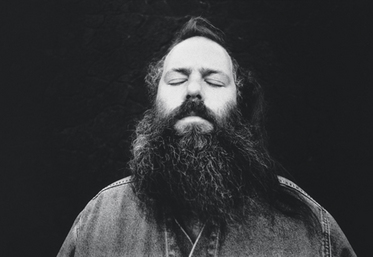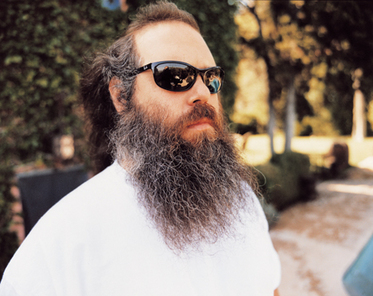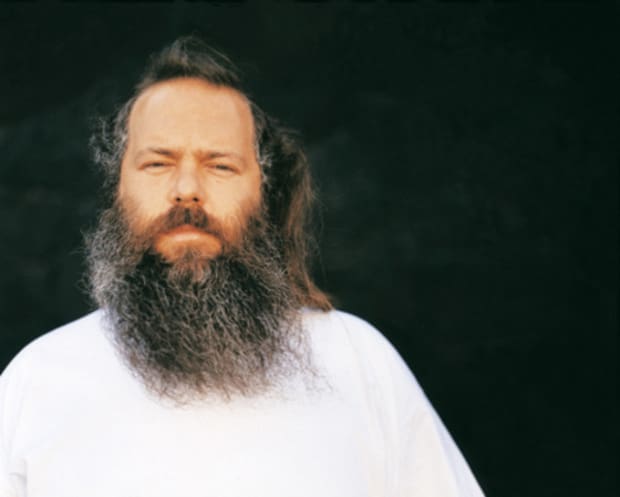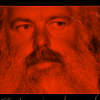FADER #23, AUGUST 2004: He produces bands he likes with broad gestures and micromanages his daily life with prayer beads and a two-way. This is Rick Rubin, Inc.
“I can remember driving into Malibu one night,” says über-producer Rick Rubin. “It was probably eight o’clock on a summer night, it had just gotten dark and there was a giant moon in the sky. I was listening to ‘I Believe In You’ from Neil Young’s After The Gold Rush. The song had such an overwhelming effect on me that I had to pull off the road. It felt like my heart stopped. It felt like I was just in this other experience. There was some feeling of death related to it too, but it didn’t feel scary or bad, it just felt beautiful and connected and expansive. It was fantastic. Those are the moments I’m looking for.”
On a recent commute of my own from the bar to the train to the bus home, I listened to the only record I had with me produced by Rubin—the Mars Volta’s De-Loused In The Comatorium. To listen to it is to be imploded into a single molecule, sucked into a vacuum, passed through a portal and exploded into infinity. You can try to regain your center by focusing on the driving straight line of the drums or chasing the meandering trails of the guitar or soaring with the wail of the vocals, but no matter how hard you try to put one foot in front of the other and stay the course you end up being tossed and spun amidst the murk of the whole heaving mess. It’s like trying to count yourself to sleep at night—you focus on the individual numbers, but by the time you get to 11 the counting is on autopilot and your mind is scampering up whatever dangling tendon of thought it happens upon. Before you remember that you were even counting at all, you’re well into the mid-thirties and still climbing—37…38…39. It’s a powerful fucking experience and a powerful fucking record and you wonder how it could possibly have been made to sound that way so you turn to the liner notes for help and it just says “Produced by Rick Rubin with [MarsVolta co-founder] Omar Rodriguez-Lopez” which is no kind of fucking help at all. Just because the album is more than the sum of its parts doesn’t mean that factoring in the man who glued the parts together balances the equation.
In his career as a producer, Rick Rubin has amassed one of the most astounding discographies of all time. There are people like Sam Philips of Sun Records and Phil Spector with his “wall of sound” and Berry Gordy of Motown and Jerry Wexler with all those great soul singers and Teo Macero who produced Miles and Monk, but while some of those producers may have had more great records than Rubin (depending on who you ask), all of them tended to specialize in a certain genre. Rubin’s credits, however, are so diverse that any self-respecting music freak probably hates at least half of the records he’s produced. Rubin’s upcoming projects include new releases from the Jayhawks, Audioslave, Weezer, Nine Inch Nails, System Of A Down, and Shakira, none of which sound particularly intriguing to me, but the only thing that would be more difficult than finding someone who likes all of Rubin’s productions would be finding someone who doesn’t like any of them.
Along with former partner Russell Simmons, Rubin played a crucial role in hip-hop’s expansion from underground phenomenon to mainstream force by founding Def Jam Recordings in 1984 and producing early albums by Run DMC, Public Enemy, the Beastie Boys, LL Cool J, the Geto Boys and others. While still establishing himself and Def Jam in hip-hop, Rubin turned to heavy metal, making a grip of records by both Slayer and Danzig; since then he’s worked with the Red Hot Chili Peppers, Tom Petty, Nusrat Fateh Ali Khan, Aerosmith, Saul Williams, Andrew Dice Clay, Rage Against The Machine, Limp Bizkit, the Cult, Mick Jagger, Lucinda Williams and god knows who else. Rubin also spearheaded, produced, and released the flourish of music that Johnny Cash recorded over the final years of his life, and recently returned to hip-hop out of nowhere with “99 Problems”, the best song on Jay-Z’s final album.
Of course when you ask Rubin himself what he did the day before, just to start off the phone conversation with something straightforward, the first thing he says in his patient, thoughtful tone is, “I woke up and meditated,” which means that just a few hours after you were lying in bed counting, trying to block out thoughts about that Mars Volta record and your student loan and the redhead you saw at the post office, Rubin was on a mat somewhere in that huge fucking LA mansion with the oversized Buddha statues and the shaggy dogs and the Ted Nugent-style stuffed polar bear, just sort of generally sitting amidst the unity and euphoria of enlightenment. “I started meditating when I was fourteen,” says Rubin, “but my interest in otherworldly things started when I became a magician at nine years old. When you’re that age you don’t know the difference between magic, spirituality, and the occult. It’s all kind of the same—they’re all other realms. I feel like those realms play a role in”—Rubin pauses to carefully choose his words, but ends up just saying—“they play a role in everything. The spiritual connection that I have plays a big role in my ability to do my job.” When Rubin finished meditating, he exercised, showered and started his workday.

Although his approach to music is highly theoretical and spiritual, the number of logistical concerns that stand between opportunities to apply that approach are many, and Rubin takes responsibility for managing those concerns. “I try to be a support system for the artists that I work with,” he says. “If an artist doesn’t have a manager, if the stress of that is getting in the way of their art, I’ll set up meetings with a manager and arrange everything. We”—meaning Rubin and the staff of his in-house office—“just try to be a support system so the artists can do their best work. And again, sometimes it has nothing to do with music. I have filmmaker and comedian friends that I have that relationship with.” So while Rubin’s mornings begin with his contemplation of the macro, his workdays are often filled with the execution of the micro. When the contact sheets from the photo shoot for this story came in, one series of portraits had Rubin in the back
of his Rolls Royce, calmly looking towards the camera while clutching both a string of prayer beads and a two-way pager to his chest.
The rest of Rubin’s day consisted of him stopping by the rehearsals of various bands that he’s about to produce to check in on their progress. Although he is not considered a taskmaster—there are no Spector-like stories of him locking musicians in practice rooms or threatening them with firearms—he demands that his bands be prepared before entering the studio. “We write for two or three months, then Rick comes and sits through rehearsal for another month or two, and then we go into the studio,” says Anthony Kiedis of the Red Hot Chili Peppers, a band that’s worked with Rubin since he produced their breakthrough record Blood Sugar Sex Magik in 1991. “His participation is incredibly non-chalant. He just comes by and chills out, sometimes horizontally. He’s got a pen and paper and is somewhere between a nap and a meditation. Or sometimes he’s on the phone and sometimes he isn’t. He notices things about colors and melodies and textures. He’s listening to not only the drumbeat itself, but also how it’s relating to the bass part. He has an incredible head for arrangement.”
With most great producers, their primary strengths and weaknesses are evident in the range of successes and failures present in their discography—you can analyze the records they’ve worked on, recognize the common threads, and draw conclusions about how they work and what, exactly, they bring to a recording session. But with Rubin, the diversity of his projects and the absence of any trademark touches make such guesswork extremely difficult. When asked if there is a patented Rick Rubin sound, Rubin replies, “Not in the way Phil Spector has a sound or the way that even maybe Daniel Lanois has a sound, but there tends to be an in-your-face quality, an intimate and personal quality and a sense of reality. It’s as though you’re there with the artist. There’s a Tom Petty record I made that I really like called Wildflowers. It sounds like we made it in an afternoon. It took us two years to make it sound like we made it in an afternoon.”
Perhaps the key to Rubin’s work is that it is not active, but reactive. Throughout our conversation he insists that he has no technical skill whatsoever. He isn’t interested in or capable of taking what his artists give him and making it great by applying his production skills to what he has received. Instead, his skill is in his ability to demand the best work the artist is possibly capable of up front, and to create the environment in which that demand is most likely to be answered successfully. In that way, Rick Rubin can only be as great as the artists he has chosen to work with. His legacy is defined by his taste in the music of others, not in his own ability.
When I spoke with members of the (International) Noise Conspiracy, the latest addition to the roster of Rubin’s American Recordings and the band that seems to be his current pet project, I asked them why, very specifically, they thought Rick Rubin was the right producer for their band. They looked confused by the question, as though the question was ridiculous, as though they wanted to answer, “Because he’s motherfucking Rick Rubin!” They didn’t seem to realize that unless they inherently have what it takes to make themselves into “the motherfucking (International) Noise Conspiracy!” they will always just be the (International) Noise Conspiracy. Rubin is not in the business of making average bands great.

“I guess it really is about me being a professional fan,” Rubin says. Like most fans, Rubin is still in awe of the artist—after all these years he still treats the musicians he works with as though they are fragile; as though their creative spirit may be stifled if they are bothered with the everyday haggles of the music business. Rubin meditates to experience the harmony of the universe and help others reflect some of that harmony through music. He runs an office out of his house to keep distractions of the micro away from those who might be able to reflect some of the macro on the rest of us.
Although the first half of my conversation with Rick Rubin was largely about the details of his daily routine, his ideas about different genres of music, and his life as a teenage loner on Long Island who was in love with punk rock and hip-hop, the second half was largely about spiritual matters—about meditation and harmony, “and when I say harmony, I don’t mean two voices singing the third and the fifth of a part,” as he put it. It was about moments like the one Rubin had while driving into Malibu, listening to Neil Young in the blue glow of a moonlit summer night. But just before we hung up, Rubin mentioned filming the video for Jay-Z’s “99 Problems” and asked if I had seen it yet. When I told him I hadn’t, he suggested I call Def Jam to get someone to show it to me, that it would be worth it. I politely said I would, thanked him for his time and hung up the phone. As I stood up and gathered my notes, music began blasting out of the office next door: If you’re havin’ girl problems I feel bad for you son—I got 99 problems but a bitch ain’t one. Hit me!
In disbelief, I walked into the office and there was Rubin on the TV, looking gangster as fuck riding shotgun in Jay’s Lexus, walking through Brooklyn with his friend Vincent Gallo, and meditating as Jay-Z gets blasted full of bullets. It was a strikingly surreal moment, a moment of some strange harmony—and I don’t mean two voices singing the third and the fifth of a part. “What are the chances?” I thought. But then I was introduced to the executive from Def Jam who had brought the video in. He looked up from his two-way and shook my hand.



